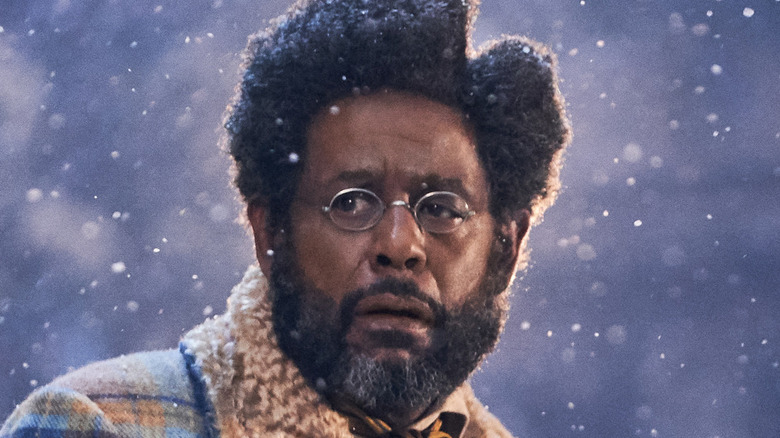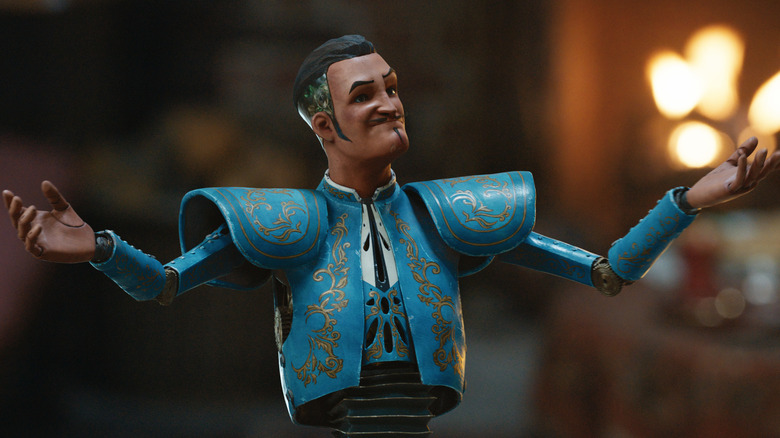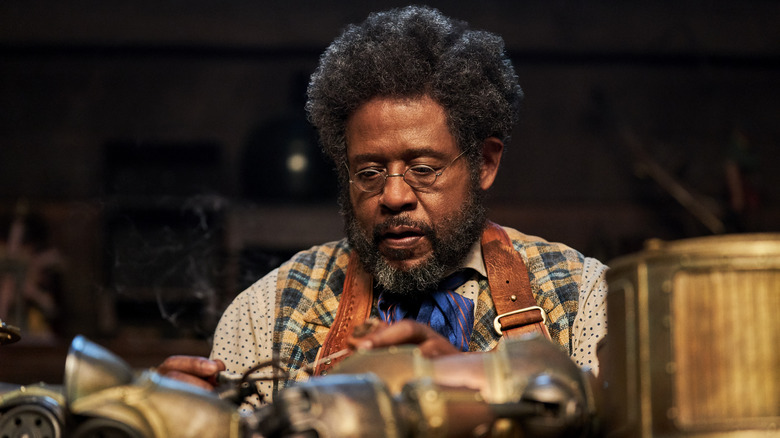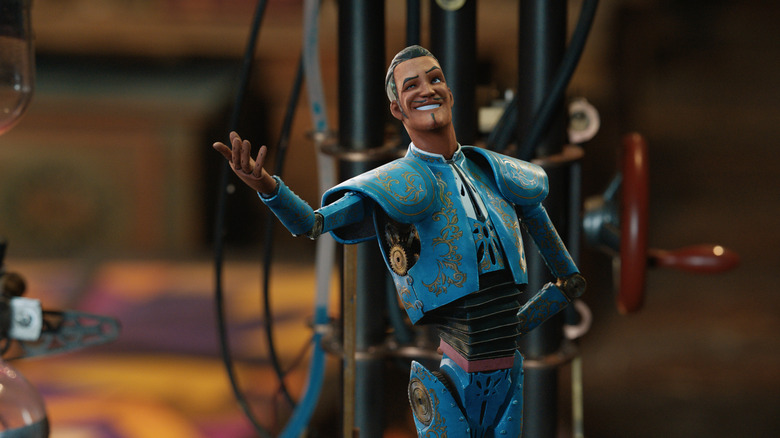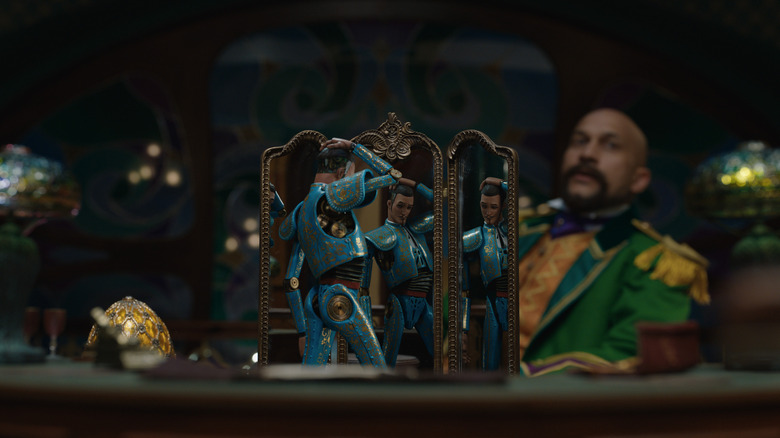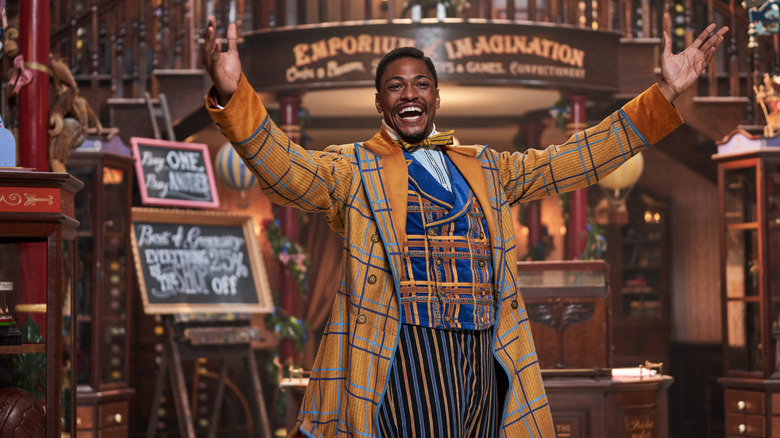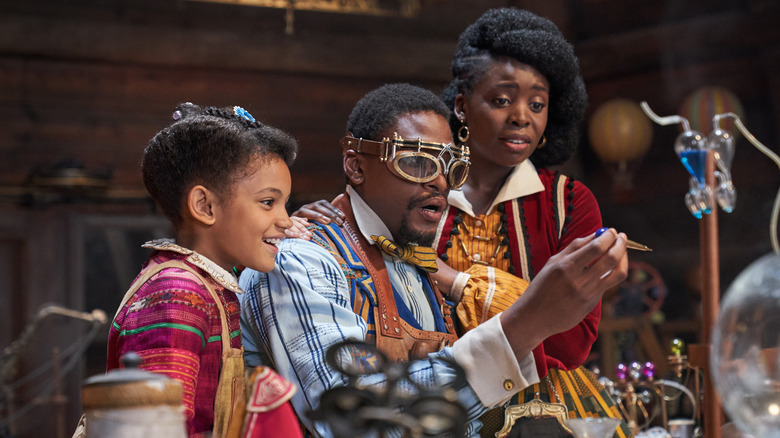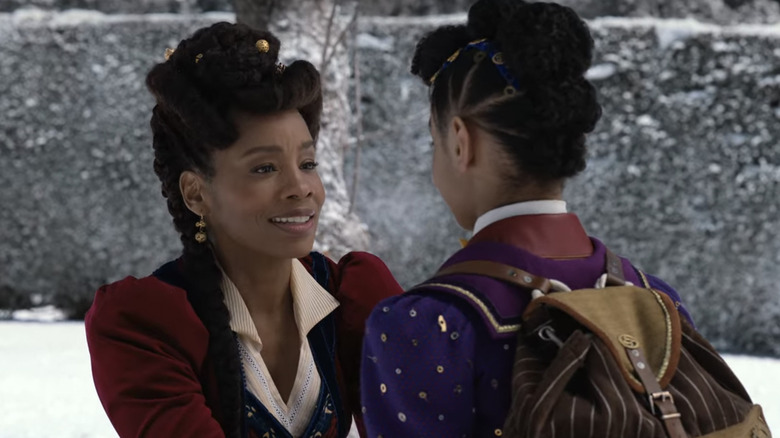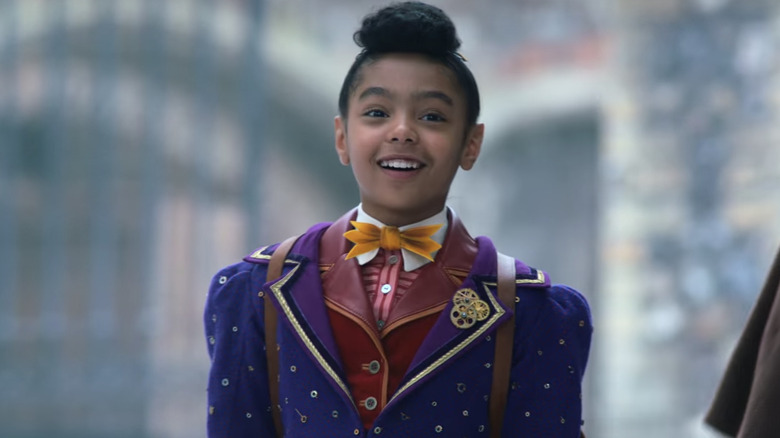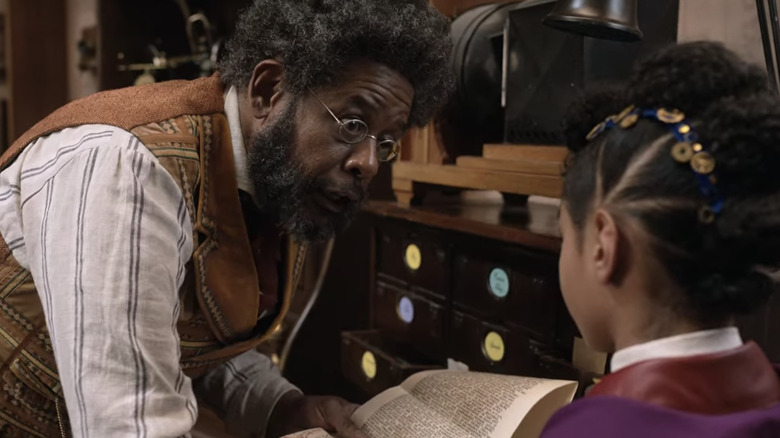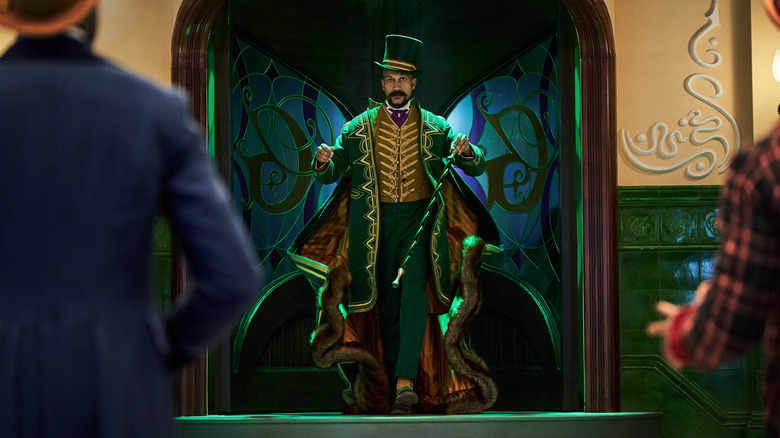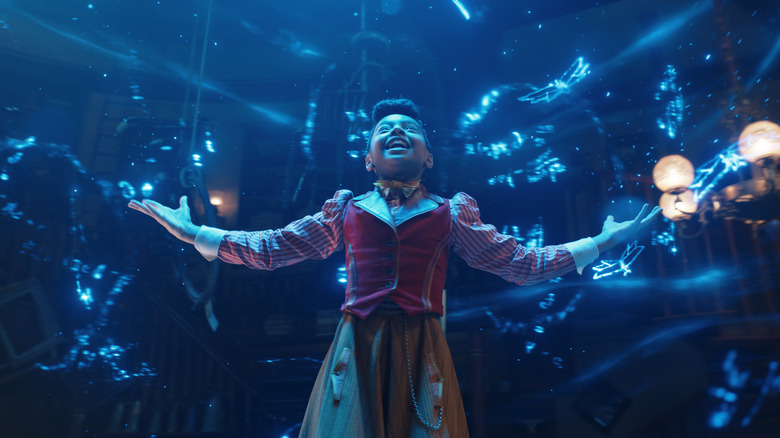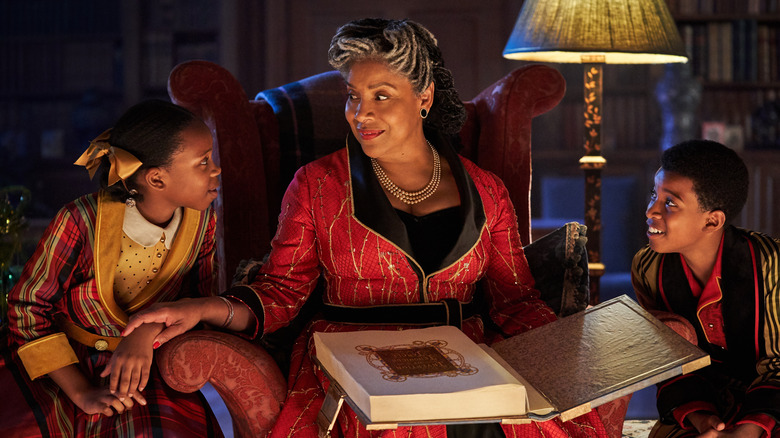Things Only Adults Notice In Jingle Jangle
Certain movies have a special power to bring the entire family together and leave the experience feeling as if they've been hit by a zap of happiness. "Jingle Jangle: A Christmas Journey" just so happens to have that power, yet the film's events likely land differently for kids and adults.
"Jingle Jangle: A Christmas Journey" follows Jeronicus Jangle (Forest Whitaker), a brilliant toymaker and inventor who, at long last, discovers how to make toys sentient. Unfortunately, he trusts his apprentice, Gustafson (Keegan-Michael Key), to look after his one-of-a-kind Don Juan Diego toy (voiced by Ricky Martin). When Jeronicus returns to his shop, he finds that Gustafson stole his toy and inventions book. The events that play out lead to Gustafson becoming the best toymaker on the planet while Jeronicus lives in squalor. Sadly, he even loses his wife, which leads to an abundance of despair and depression. Eventually, his daughter Jessica (Anika Noni Rose) estranges herself from him. Fast forward to the future, and Jessica's daughter, Journey (Madalen Mills) — who's adventurous, creative, and brilliant, just like a younger version of Jeronicus — visits her grandfather. And then their lives, for the better, change.
What follows is a magical story about love, loss, hopes, imagination, dreams, and just a little bit of magic. Let's take a look at the things only adults notice in "Jingle Jangle: A Christmas Journey."
The toy Don Juan Diego is extremely rude
Don Juan Diego, at first glance, is a marvel. He is, after all, a sentient toy matador that can walk, talk, and have its own thoughts. Yet, a more seasoned viewer will notice that after the magic of a toy coming to life has worn off, Don Juan Diego is a rude little being.
Not only does the toy convince Gustafson to steal Jeronicus' invention book — which then leads to Gustafson making those inventions a reality — but he also controls Gustafson's entire life. He even slaps Gustafson, which is shrugged off as a joke. Look, we get it: We're talking about a toy here. But toy or not, good manners should never be overlooked. While Don Juan Diego might seem valiant and funny on the surface, it's not hard for an adult to realize how rude he is throughout the movie. (Sidebar: How does Don Juan Diego have a personality?) Surely, Jeronicus didn't make him this rude as he was planning to mass-market the toy for kids to enjoy.
Jeronicus could have used his brilliance for something much greater
Though toys are great, Jeronicus is brilliant and could have invented something more groundbreaking. After all, he basically solved artificial intelligence via the conniving Don Juan Diego. Although children might believe a toy they can have a relationship with is the greatest gift since peanut butter and jelly, adults will notice that Jeronicus could have created something world-defining.
Typically, with inventions like Jeronicus', the government steps in and wants the inventor to create weapons (usually robots) for the military, but that's not what we're talking about. In a different universe, perhaps Jeronicus could have created sentient robots to help people in need. But alas, this is supposed to be a holiday-themed story that revolves around the wonderful imagination of a child. We admit that a sentient toy is pretty awesome, yet it doesn't always work out in the movie world.
Just like Gremlins, conscious toys tend to be a mistake in the movie world
Though Jeronicus has good intentions, more seasoned audience members have come to learn that sentient toys tend to be a mistake in the movie world –– at least when real-life humans are involved. Case in point: "Gremlins," a movie that features a father who wants to mass market furry little creatures (that he knows nothing about) and sell them during the holiday season. This proves to be an utter mistake when the man and his son don't follow the directions of the Gremlin, and the toys start to mutate, multiply, and turn into little monsters, taking over the town in the process.
In the case of "Jingle Jangle," events don't get as far out of hand. But if Jeronicus mass-marketed the Don Juan Diego toy like he originally planned, who knows what would have happened. Reminder: Don Juan Diego isn't the kindest being of all time, and he convinced Gustafson to steal Jeronicus' inventions, pretty much ruining his family's life in the process. And this is just one instance –– it remains to be seen how much chaos countless Don Juan Diego toys would have caused.
Gustafson takes his orders from a toy
Gustafson might be rich and known as the best toymaker in the universe, but he actually has a pretty sad existence. And we don't mean that in a mean way — we kind of feel bad for him. For starters, Gustafson takes his orders from a toy, which is, to put it lightly, an odd existence. Making matters worse, Gustafson's best friend also appears to be the same toy, Don Juan Diego, that controls his life.
More seasoned audience members will notice that while Gustafson has all the riches and fame in the world, none of it buys him happiness. Gustafson doesn't appear to have friends or loved ones, though the film glosses over this point. Gustafson did have Jeronicus' love and support when he was younger, but he ruined that when he took credit for his work. Indeed, Gustafson might appear to have a perfect life and all the success in the world, but the fact that he takes his orders from Don Juan Diego — who also appears to be his only friend — speaks volumes of how unhappy he likely is.
Jeronicus immediately leaving Don Juan Diego after it comes to life is absurd
A young Jeronicus finally discovers how to make sentient toys, which is supposedly his ultimate dream. Yet, virtually right after he makes this discovery, he leaves the toy with Gustafson to look after. As history would have it, Gustafson takes Don Juan Diego along with Jeronicus' invention book. That begs the question: If Jeronicus knows how major of a breakthrough a sentient toy is, which he does, then why would he just leave the toy with his young apprentice right after making this discovery? It seems absurd that he wouldn't take the toy with him or at least have one of his family members look after it.
Nevertheless, this turn of events leads to Gustafson becoming the most renowned toymaker in the world while Jeronicus' entire life and well-being go in the opposite direction.
Jeronicus allows one event to ruin his entire life
After Gustafson takes Jeronicus' invention book, he's rightfully rattled and goes through a creative funk. His seemingly ultimate dream of making a sentient toy is ruined, and he can't seem to match that single act of genius. Of course, he also loses his wife, which is a different matter in itself, but his life starts to go down a dark path the moment Gustafson betrays him.
At the same time, adults will likely recall that Jeronicus' grieving over his wife proves that there's no single amount of time it takes to get over something, especially an event as tragic as losing your partner. This eventually leads to Jessica estranging herself from her father. Unfortunately, he doesn't snap out of his funk until years later, thanks to Journey's adventurous spirit and timely arrival. Ultimately, though many bad events lead to Jeronicus' downfall, it all stems from Gustafson stealing his inventions.
Journey's halted relationship with her grandfather
Though every family is different and Jessica has every right to keep her daughter, Journey, from meeting her grandfather, it can be argued that Jessica should have let her daughter visit Jeronicus sooner. Jessica apparently would only let Jeronicus see her if he reached out and asked to be part of her life, yet she presumably never told him that, meaning there's no way he could have known those stipulations. To Jessica's credit, one would think Jeronicus would want to meet his granddaughter –– if he knew she was even born, that is. Life is complicated.
Luckily, Jessica eventually lets her daughter meet Jeronicus, and everyone's life changes for the better (well, not necessarily Gustafson's). But this event doesn't come without its own questions. For example, why would Jessica allow her daughter to wander off into the world unsupervised? And, well, the questionable decisions only grow from there.
How does Journey know where to go when she visits her grandfather for the first time?
Though it might sound like we're picking nits, when Jessica allows Journey to visit Jeronicus, she seemingly wanders to a place she's never been before. How does she know where to go in this unknown land? Better yet, why does her mom let her wander to a new place by herself? While this film is sprinkled with movie magic, it's not hard for an adult to notice that Jessica is hesitant to allow Journey to meet Jeronicus, yet when she finally pulls the trigger, she just lets Journey visit him unattended. In fact, Jessica doesn't even take her to Jeronicus' home, and Journey is expected to navigate this new town looking for a person she's never met before.
Journey has likely seen a picture of Jeronicus before, but that still doesn't explain how she knows where to go in this unknown place. And it especially doesn't explain why the rightfully protective Jessica just drops her guard and lets her young daughter journey to her grandfather without parental supervision.
Who makes their innocent granddaughter sign a contract?
Jeronicus makes his own young granddaughter sign a contract that she'll obviously never read because of its length. We understand that Jeronicus doesn't want anyone to touch his inventions because the last time he trusted someone, they stole his ideas. Not to mention, Jeronicus has never met Journey before, and there's also the fact that he probably doesn't want her to get hurt. But his intentions are clearly not about that: He, for better or worse, doesn't trust Journey.
Nevertheless, he discovers that Journey is, in fact, his granddaughter. So, the question remains: Who makes their granddaughter sign a contract? This seems a bit harsh to hold her accountable to something like this, especially since Journey — despite being wise beyond her years — likely doesn't know what everything on the contract entails or its ramifications. That said, Jeronicus' act was more out of caution, as Journey breaks the contract almost immediately by being curious and touching his inventions.
For a toymaker, Gustafson has a big ego
We're not saying being a toymaker, especially one as successful as Gustafson, isn't an honorable profession. But the point of this career is to make children happy –– to be kind and compassionate. Yet Gustafson is the complete opposite. He has a huge ego and reminds people of how many times he has won toymaker of the year. He puts on pretentious shows to unveil his new toys. And he appears to think he's better than everyone else because of his success and fortunes.
Yet, more seasoned viewers will notice that his behavior is likely a result of him feeling inadequate. After all, he stole his inventions from Jeronicus, and he doesn't actually create anything himself. He is, by all definitions, an insecure fraud who deflects so that people think he's greater than he actually is. Jeronicus, on the other hand, is more concerned with creating a product that will benefit people's lives, as opposed to the accolades that come with a groundbreaking invention.
Journey, as her name suggests, is fearless
Journey travels to a place that she's never been to before to meet someone she's never met all by herself. She even dances on a roof for good measure, though that occurrence is part of the musical aspect of the film. It's not hard for adults to recognize that Journey has an adventurous spirit and is not afraid to take on the world. She also just so happens to be a genius.
Journey's fearless nature and appetite for creating play a major role in getting Jeronicus out of his seemingly endless funk. He likely sees his younger self in her, as he was once driven to create something magical no matter how difficult the task. Yet the fact that Journey doesn't hesitate to visit Jeronicus just shows how fearless she is, and it also puts the childlike nature of imagination and dreaming big on full display. Journey is young, and the world has yet to kick her down, so she still believes anything is possible –– and it is, as long as you work hard and don't lose your appetite for life.
Jingle Jangle isn't really a holiday movie
"Jingle Jangle: A Christmas Journey," as the title suggests, is supposed to be a holiday movie, yet it's really just a film that takes place during the holidays. This is similar to movies such as "It's a Wonderful Life." Though audience members tend to watch this movie during the holiday season, the movie itself doesn't revolve around Christmas — it just so happens to take place during this magical and merry time.
There's certainly holiday magic in "Jingle Jangle: A Christmas Journey," as events are far-fetched, and everything works out for the main characters in the end. Nevertheless, the movie is more about Journey entering Jeronicus' life and helping him reach his potential. Ultimately, "Jingle Jangle: A Christmas Journey" is a musical fantasy film that's flooded with so much life that it's hard to leave the movie not feeling hopeful, if only for a little while. Indeed, everything mostly works out for the main characters by the movie's end.
